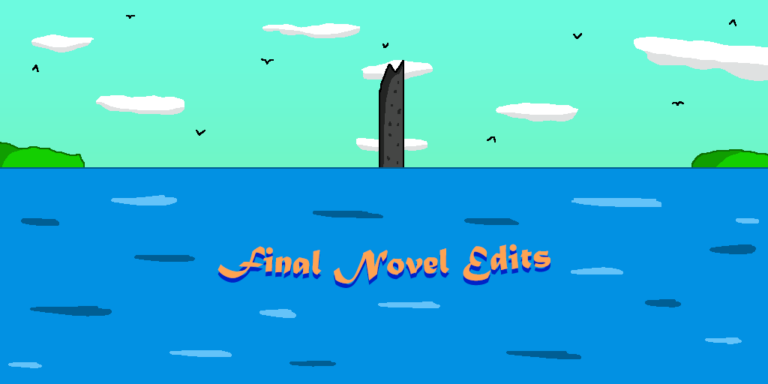Join US
Do you want to build the fantasy world you’ve always dreamed of?
Subscribe to receive notifications when a new post is out and for our monthly newsletter!
You can always unsubscribe anytime.


By this point, you’ve already edited and revised your novel several times and it’s already been read by your beta readers and the editors you chose to work with. In the latter two, you listened to their thoughts and suggestions on how to improve your book. You made a list of what they said and put it all in one document. With all this new info, it’s time to do the final novel edits.
The chief purpose of the final novel edits is to incorporate the suggestions you got from the beta readers and editors into your novel to ensure that it’s in the best shape as it can be. This is a crucial step before you launch your book since after you’re done with it, you’ll be spending more time getting it ready for launch day, meaning you won’t have as much time to polish it or add some more finishing touches.
The groundwork for these edits begins several phases earlier, starting with your beta readers. Thus, information-gathering is key to success here as you learn what other people feel are your novel’s weaknesses. Armed with this knowledge, you can proceed with the final novel edits.
Concurrent with the edits, you’ll be making revisions. You’ll make a series of changes that range from the minor to major rewrites as you merge plots and characters or eliminate some altogether. Think of it like getting rid of the things that are dragging your novel down which will ultimately be beneficial in the long run.
Once you wrap up the final novel novels and done all the revisions you felt you could do, have people read it. You can use the same group of beta readers you did earlier or you can go with a totally different group. It’s important to hear what they have to say after they read it so you can decide whether you need to do another round of edits or not.
This is article number fifty-one in the series about writing a fantasy novel. If you’re interested in our other ones, they’re available on our blog page.
Before you start with the final edits, you need to know what parts of your novel you need to work on. Even though you edited it more than once, there will be things you’ll overlook because you’re seeing it through the lens of the writer, not the reader, even though you tried to approach it from the reader’s perspective. At this point, it’s time to bring other people in.
Information-gathering is invaluable here as you talk with the people you selected — both readers and editors — to read your book. Listening to other people’s perspectives helps makes your book better since you learn how they see it. They will bring up issues they think it may have as well as ask you questions so that they can get some clarity.
Common issues that typically surface are uneven character development, awkward plot pacing, and scenes that don’t advance the plot in a meaningful way. It’s imperative that you learn what the weak spots are beforehand so that you can focus on how to fix them. Having constant interactions with your readers as they go through your novel will give you the information you need before you start the final novel edits.

Gathering the information you need takes a bit of time. As such, patience is a virtue. Don’t have your readers rush through it. Having them do so runs the risk they’ll miss something, perhaps a critical issue that you have no idea about, and it could ultimately come back to bite you later on.
Once you’ve discussed it with your readers and editors, take all the feedback you got over all the times you talked with them and put it in one place. Undoubtedly, you’ll have a lot of info to look through and having it all in one place makes it easier for you to see what needs to be done.
You can organize them by category or whichever works for you. Organizing the feedback enables you to keep track of the issues that remain unresolved. It also serves as a benchmark in which to track your progress as you tackle them, one by one.
Now that you’ve compiled all the information — hopefully in one document for convenience’s sake — you gathered by conversing with both your readers and editors, it’s time to get to work in implementing them. But effort you do so, take a look at all the items on said document. Reviewing it before you start helps you keep your focus on what matters, since there will be those that require higher priority than others.
One crucial thing to note as you start the final revisions is that not all revisions are equal. Some are far more important and deserves more of your time to fix whereas others can wait for later. Prioritize those that are more salient to the plot first. Before you start working, make a duplicate document of your novel so that you can work on it and compare the changes to the version before it.
With the final novel edits, devote more time to those that fundamentally affect the plot to the point where it feels like you’re working on its foundation. You could initiate a significant restructuring where the overall plot remains the same but its underpinnings are being changed. It’s as if you’re adding or removing scenes to have it evolve in a natural progression and smoothing out its rough edges, resulting in an overall better plot.

Once you’re done with altering the foundation, it’s time to move onto the major ones such as key scenes that need reworking or fleshing out a character arc to give readers more clarity. While you may already have done so before you had other people read it, you can incorporate their feedback by either rewriting them or making changes to have them grow organically.
You can always add new scenes to help ensure a smoother transition between pivotal scenes. Doing this also helps either slow down or ramp up the story pace which is something you need to keep in your mind constantly as you continue making the final novel edits. You still want these new scenes to feel natural to the readers as well as move the plot forward. These scenes could range from discovering a new facet of one of your characters doing some kind of activity like walking or riding a horse.
Don’t forget to clean up as you proceed through your novel. This is where you concentrate on minor issues like misspelled words, incorrect punctuation, and so on. You want to make your book be as professional as can be and having one devoid of any grammatical errors tells readers you went to great lengths to create a good story that they can enjoy.
As you start wrapping up the final edits, you have to make a decision: do you want to go ahead and have beta readers go through it or do you want to let it percolate for a bit before you start another round so you can go in with a fresh perspective? Sometimes it’s a good idea to just let it sit for a little bit so you can review it later on.
Should you opt to initiate another round, this time moving slower than usual to ensure that your work is in the best possible shape it can be, you can look at how the changes you made affects your novel. If you feel like they improved it, keep them. If you think they hurt it, do what you need to do to fix them.

Whether you did another round of edits or not, you need to have people read the new version of your novel. You want to see what they think of it, the changes you made notwithstanding. This helps you gauge if you can move onto the next step or not.
You’re then presented with another choice to make: should you go with the same group you used before or go with a wholly new group? Using the same group means you get to hear their thoughts on the new version and how it compares to the one they read. They’ll definitely let you know if they think it’s better or not.
Some writers like to have a group of people who haven’t read it yet take a look at it. That way, they see how their book holds up under scrutiny. It’s very much like a repeat of the process of working with beta readers with the exception that the version they’ll be reading could very well be the final one or the one right before it.
The final novel edits is an essential step of the process of launching a book. It’s where you polish it up and work on fixing the issues that need to be fixed before launch day which is still a while away. The goal is to have your book be in the best shape it can be so that when it hits the bookshelves, people will be interested to buy it.
Before you can start the final edits and revisions, you have to gather information from other people. Hearing what your beta readers and editors have to say helps you see what issues you have to deal with. It’s best to put it all in one place and organize it whichever way works best for you.
Armed with all the information you got from the people who read it, it’s time to get to work on the final novel edits. Fine-tuning it is a continual process as you streamline it by changing the things that are hampering it, delving more into how your characters develop throughout the novel, or whatever else issues you have. Keep track of your progress by checking each one off the list of things to do.
As you sprint towards the finish line in regard to the editing and revising, you have to decide whether to go through it again or have people read it. It’s entirely up to you if you want to use the same group of people or have some new eyes read it. Either way, you’ll receive feedback and you can use that feedback to determine whether to do some more work on your novel or not.
Doing the final novel edits will only help your book and don’t you want it to be an example of your best work?
Let me know what you think in the comments below. (Note: this is an account-exclusive feature).
If you don’t have one, you can register here. It only takes a few moments of your time!
Liked this article and want to subscribe? All you have to do is fill out the form below and that’s it!
Thanks for reading this and until the next time,
Sunfire
Subscribing means you receive:
You can always unsubscribe anytime.
Do you want to build the fantasy world you’ve always dreamed of?
Subscribe to receive notifications when a new post is out and for our monthly newsletter!
You can always unsubscribe anytime.